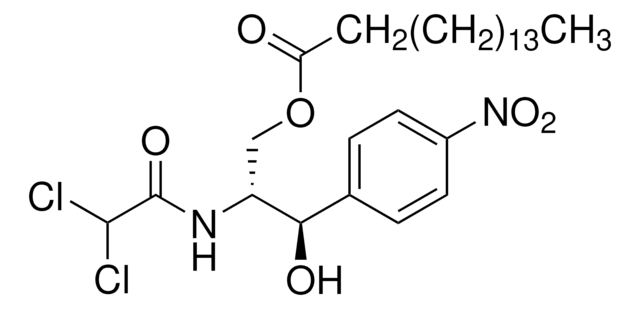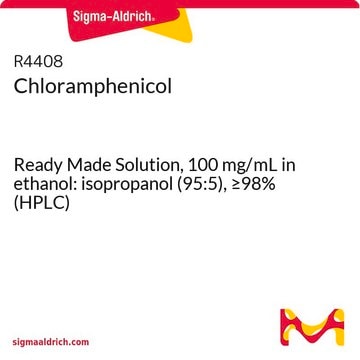C1425000
Chloramphenicol sodium succinate
European Pharmacopoeia (EP) Reference Standard
Sinónimos:
Chloramphenicol succinate sodium salt, Chloramphenicol α-succinate
About This Item
Productos recomendados
grade
pharmaceutical primary standard
API family
chloramphenicol
manufacturer/tradename
EDQM
application(s)
pharmaceutical (small molecule)
format
neat
SMILES string
[Na].O[C@@H]([C@@H](COC(=O)CCC(O)=O)NC(=O)C(Cl)Cl)c1ccc(cc1)N(=O)=O
InChI
1S/C15H16Cl2N2O8.Na.H/c16-14(17)15(24)18-10(7-27-12(22)6-5-11(20)21)13(23)8-1-3-9(4-2-8)19(25)26;;/h1-4,10,13-14,23H,5-7H2,(H,18,24)(H,20,21);;/t10-,13-;;/m1../s1
InChI key
RJOAHMNSYANTPN-OWVUFADGSA-N
¿Está buscando productos similares? Visita Guía de comparación de productos
General description
Application
Packaging
Other Notes
related product
signalword
Warning
hcodes
Hazard Classifications
Acute Tox. 4 Oral - Carc. 2
Storage Class
11 - Combustible Solids
wgk_germany
WGK 3
flash_point_f
Not applicable
flash_point_c
Not applicable
Elija entre una de las versiones más recientes:
Certificados de análisis (COA)
Lo sentimos, en este momento no disponemos de COAs para este producto en línea.
Si necesita más asistencia, póngase en contacto con Atención al cliente
¿Ya tiene este producto?
Encuentre la documentación para los productos que ha comprado recientemente en la Biblioteca de documentos.
Nuestro equipo de científicos tiene experiencia en todas las áreas de investigación: Ciencias de la vida, Ciencia de los materiales, Síntesis química, Cromatografía, Analítica y muchas otras.
Póngase en contacto con el Servicio técnico






